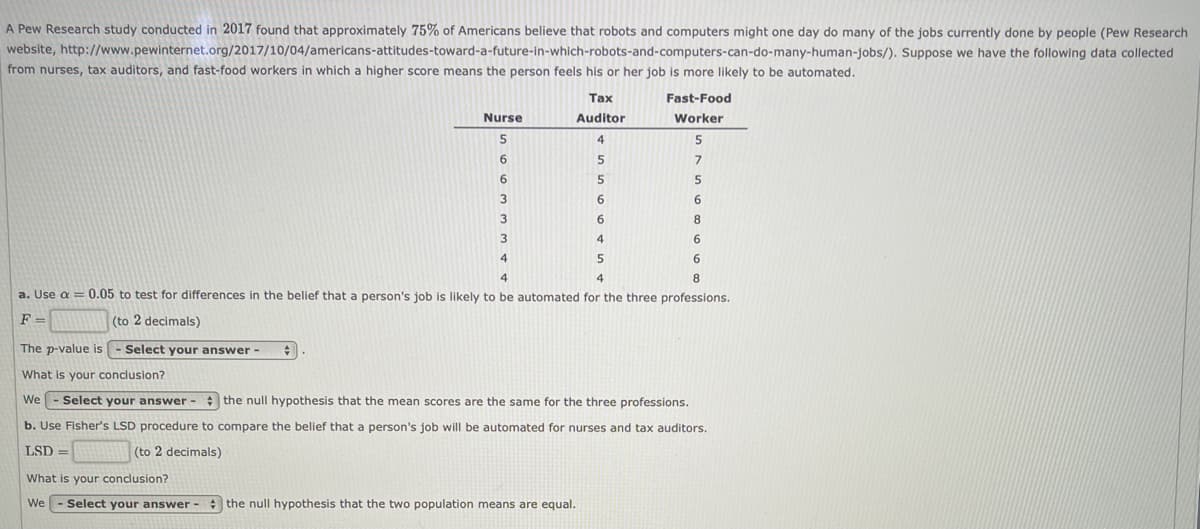d fast-food workers in which a higher score means the person feels his or her job is more likely to be autor Тах Fast-Food Nurse Auditor Worker 4 6. 6. 5. 6. 6. 3. 6. 8. 4 6. 4 6. 4 4 8. differences in the belief that a person's job is likely to be automated for the three professions. als) ur answer- the null hypothesis that the mean scores are the same for the three professions.
d fast-food workers in which a higher score means the person feels his or her job is more likely to be autor Тах Fast-Food Nurse Auditor Worker 4 6. 6. 5. 6. 6. 3. 6. 8. 4 6. 4 6. 4 4 8. differences in the belief that a person's job is likely to be automated for the three professions. als) ur answer- the null hypothesis that the mean scores are the same for the three professions.
Holt Mcdougal Larson Pre-algebra: Student Edition 2012
1st Edition
ISBN:9780547587776
Author:HOLT MCDOUGAL
Publisher:HOLT MCDOUGAL
Chapter11: Data Analysis And Probability
Section: Chapter Questions
Problem 8CR
Related questions
Topic Video
Question

Transcribed Image Text:A Pew Research study conducted in 2017 found that approximately 75% of Americans believe that robots and computers might one day do many of the jobs currently done by people (Pew Research
website, http://www.pewinternet.org/2017/10/04/americans-attitudes-toward-a-future-in-which-robots-and-computers-can-do-many-human-jobs/). Suppose we have the following data collected
from nurses, tax auditors, and fast-food workers in which a higher score means the person feels his or her job is more likely to be automated.
Таx
Fast-Food
Nurse
Auditor
Worker
4
5
6.
6
5
5
6.
6.
6.
4
4
4.
a. Use a = 0.05 to test for differences in the belief that a person's job is likely to be automated for the three professions.
F =
(to 2 decimals)
The p-value is
Select your answer -
What is your conclusion?
We - Select your answer - : the null hypothesis that the mean scores are the same for the three professions.
b. Use Fisher's LSD procedure to compare the belief that a person's job will be automated for nurses and tax auditors.
LSD =
(to 2 decimals)
What is your conclusion?
We
Select your answer - the null hypothesis that the two population means are equal.
Expert Solution
This question has been solved!
Explore an expertly crafted, step-by-step solution for a thorough understanding of key concepts.
Step by step
Solved in 2 steps with 3 images

Knowledge Booster
Learn more about
Need a deep-dive on the concept behind this application? Look no further. Learn more about this topic, statistics and related others by exploring similar questions and additional content below.Recommended textbooks for you

Holt Mcdougal Larson Pre-algebra: Student Edition…
Algebra
ISBN:
9780547587776
Author:
HOLT MCDOUGAL
Publisher:
HOLT MCDOUGAL



Holt Mcdougal Larson Pre-algebra: Student Edition…
Algebra
ISBN:
9780547587776
Author:
HOLT MCDOUGAL
Publisher:
HOLT MCDOUGAL

